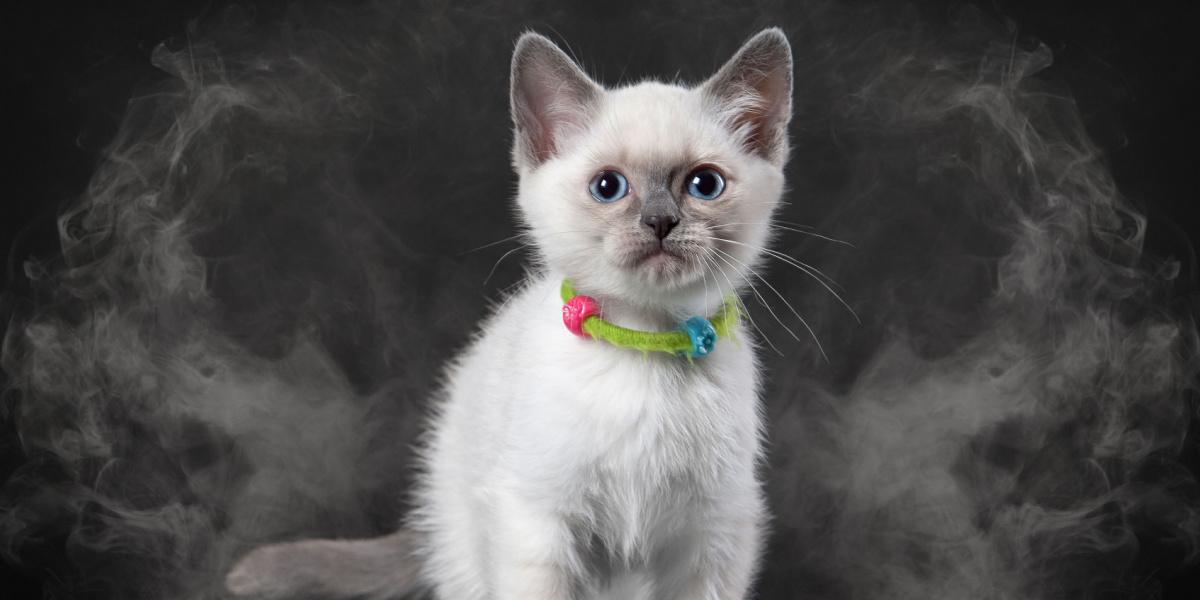
Whether you use incense for meditation, to relax, or just to make your home smell nice, it’s important to consider the safety aspects as well. A committed cat parent cares about keeping cats safe and healthy, so it’s important to understand that there are some problems with using incense and other scented candles and oils around them.
Burning incense can potentially lead to some serious health problems for cats, such as damage to your cat’s respiratory system, burns, and exposure to toxins. These issues need to be considered before using incense so that appropriate actions can be taken to keep your kitty safe and sound.
Burning incense can potentially lead to some serious health problems for cats, such as damage to your cat’s respiratory system, burns, and exposure to toxins. If possible, try and restrict the use of burning incense to one, well-ventilated room that your cat does not have access to. There are safer ways to fragrance your home. If you really want to use incense, make sure to keep it well away from cats if you can.
Key Takeaways
What Is Incense?
Stick incense is made up of multiple ingredients. Usually, incense is made mostly of plant materials combined with various essential oils. It is then burned to produce an aroma. Various fragrance options are available, from vanilla and lavender to tea tree or sandalwood.
Burning incense is an ancient practice dating back to ancient China, and was also used in ancient Egypt by priests. Today, it is used to simply create an aroma but is also a popular tool used in meditation and in religious ceremonies.
Incense was traditionally made by hand by grinding the ingredients into a fine powder and combining them with honey before coating them onto a bamboo stick. Nowadays, incense sticks are often mass-produced using a process known as ‘dipping,’ which often involves more chemicals.
6 Ways Incense Can Be Harmful to Cats
There are multiple reasons why burning incense around cats isn’t a great idea. The smoke produced can be an airway irritant, the scent can be overpowering for your cat’s heightened sense of smell, and the burning process can release potentially harmful chemicals. Incense burning has even been named by the Environmental Protection Agency (EPA) as a source of indoor air pollution!
1. Sensitivity To Smell
Cats have a wonderful sense of smell, much better than ours. In fact, to give you some idea, cats have around 200 million odor receptors which they can use to identify different scents. Humans have just 5 million – a large number, but nowhere near the amount that cats have.
This means that our pet cats are much more sensitive to odors than we are, and the smell of incense can be very strong. Scents such as eucalyptus and citrus are bold odors anyway – imagine them magnified by forty times!
Cats rely highly on their sense of smell in everyday life, using scent marking and pheromones to communicate messages both to themselves and to other cats. Overwhelming odors in their environment may mask these important scent communications, causing stress and anxiety to your cat.
2. Hot Ash
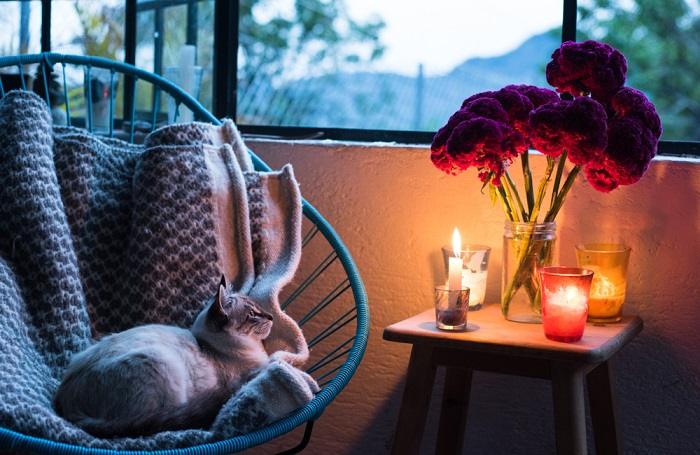
Cats sustain burns if they are curious enough to investigate your strange incense stick.
Cats should never be left unsupervised around anything which burns, including candles, fires, and even incense sticks. These may look safe, and may not look hot, but an inquisitive cat nose could easily sustain a burn if poked into the hot ash at the end of the stick. Cats are known for their curiosity, and if they knock over a burning incense stick, they could accidentally cause disaster.
3. Smoke
When incense burns, it releases smoke. This incense smoke can quickly invade the room and the rest of the house, making it difficult to get away from. Smoke is a known irritant to the respiratory tract of cats, as they are very sensitive to inhaled chemicals.
Smoke exposure irritates the lining of the lungs, causing symptoms such as sneezing, coughing, congestion, and watery eyes. It can also make cats feel lethargic and generally unwell. Rarely, cats can have an allergy to incense and its smoke, which can lead to them struggling to breathe. Symptoms can worsen over multiple or prolonged exposures.
4. Asthma
Burning incense regularly in your home will lead to long-term smoke exposure for your cat. This can cause ongoing damage to the lungs and lead to an increased risk of chronic respiratory problems such as asthma. The EPA (Environmental Protection Agency) has named incense as a source of indoor air pollution – it really does significantly affect the air quality of our homes!
5. Volatile Organic Compounds
We know that the action of burning produces chemicals via smoke. The quality of incense can vary, with a variety of ingredients being added to some sticks. Burning incense that hasn’t been made to a high standard may release certain compounds, some of which may be carcinogenic (cancer-causing) to both pets and people.
6. Oils
Incense is made using various plant materials and infused with essential oils. We know that some essential oils can be harmful to cats – irritating airways if inhaled and toxic if ingested. Cats are unlikely to eat incense, but they are known for their curiosity. It is always safer to keep any potentially harmful things out of reach, especially if mischievous kittens are about!
Other Ways To Keep Your Home Smelling Good
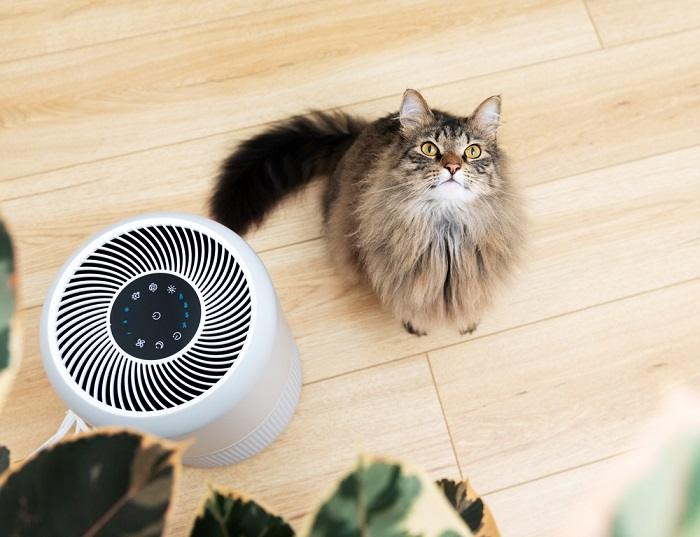
Air purifiers are a great way to keep the home smelling fresh while keeping your cat comfortable and healthy.
A beautifully scented home is a delight, and having a home that smells wonderful, relaxing, and cozy is important to many people – especially pet owners who may have to deal with a smelly litter box! So, is there a way to have a delightfully scented home without compromising the safety of our cats?
Yes! Check out these suggestions:
- Use an air purifier. Open the windows for good ventilation and make sure you dust regularly. Keeping your home clear of dust particles and dander will keep your home smelling fresh and clean.
- If you want to use something scented, use a product such as Febreze which has been certified safe for pets by the ASPCA poison service. This only applies to the Febreze fabric air fresheners – all aerosol products should be avoided.
- For a more natural scent, try simmering something like cinnamon sticks, vanilla, or cloves in a pot of water.
Essential oil diffusers, burning herbs and lit scented candles are all not recommended if you are a cat owner, due to the risks of burns and toxicity to your pet.
Keep It Safe
If burning incense is important to you, perhaps as part of your spiritual or religious traditions, there are some ways of doing so while making sure your kitty is safe.
If possible, try and restrict the use of incense burning to one, well-ventilated room that your cat does not have access to. Always store incense safely out of reach of cats. If you think that your pet may have eaten any incense, seek veterinary advice immediately.
The quality of the incense you use makes a difference. Traditionally made incense with powdered ingredients, honey, and a bamboo stick is safer, but it is more time-consuming and therefore tends to be more expensive. Low-cost, mass-produced incense made using the ‘dipping’ method means that charcoal or sawdust is often added to the stick, along with potentially harmful chemicals. Making sure you use high-quality incense can greatly reduce its impact on your pets’ health and well-being.
Summary
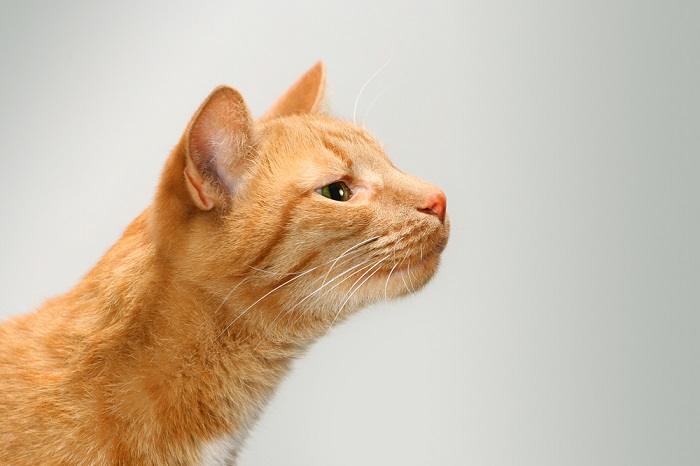
In summary, incense is not the best home fragrance choice if you have cats.
Sadly, despite its amazing smell, burning incense in your home is not ideal if you’re a pet owner. There are various properties that make incense bad for cats. This can include the overwhelming smell, the potential for respiratory disease and irritation from the smoke, and the safety of the chemicals in the incense itself.
There are safer ways to fragrance your home. However, if you burn only high-quality incense in a well-ventilated room that is off-limits to your cats, you will greatly reduce any chance of causing harm or discomfort to your cats while still having access to incense. With a bit of thoughtful planning, it is possible to still burn incense in your home and make sure that your cats are happy and healthy.
Also Read: Feline Viral Rhinotracheitis (AKA FHV): Causes, Symptoms, & Treatment
Frequently Asked Questions
Can incense kill cats?
Incense can cause multiple problems in cats, including irritation to the lungs and scent overwhelm. It is unlikely to be fatal unless the cat is asthmatic and has a severe reaction to the smoke, or ingests incense containing toxic chemicals.
Are candles bad for cats?
Candles are not advisable to be lit around cats, unless closely supervised. A cat's inquisitive nature can lead them to knock candles over, causing a fire hazard or burns. Scented candles can contain essential oils which are toxic to cats, although they are unlikely to ingest them, and the scents can be an irritant to feline respiratory tracts.
Is lavender incense bad for cats?
Lavender is mildly toxic to cats, meaning they would have to eat a lot of it for it to cause a problem. However, all types of incense are ill-advisable to have around cats, as the smoke can cause respiratory problems.




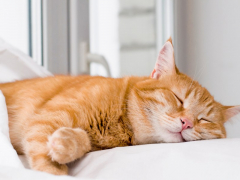
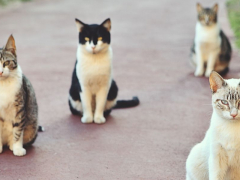

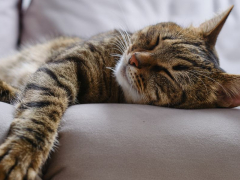
Are diffusers with Vick’s salve help my cat who gets upper respiratory infections?
Angela, the steam from a Vicks diffuser can be harmful to cats—I’d recommend avoiding it. Instead, you can steam up the bathroom using a hot shower to help give your cat some relief. This article has some great tips.
Our living room and kitchen is a combined open space with 18 foot ceilings. My husband likes to burn palo santos in our kitchen every now and then . We have a 6 year old cat and recently got a kitten. Concerned of the strong smell for our cats. What are your thoughts?
Hi Martha, it’s a little risky. Even with such an open, airy interior space, I would recommend burning it only with the windows open just to be on the safe side.
My combined living room/dining room is 45’ x 20’ x 20’ heigh. About to get a cat. No ventilation in winter. Unsafe? Nag champa traditional Indian incense. Thanks.
I’d avoid it unless you have some ventilation, like in the summertime. Hope this helps, and congratulations on deciding to get a new kitty!